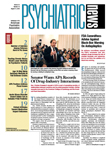A recent Supreme Court ruling that allows state courts to limit legal self-representation by people with mental illness strengthens their legal protections, contrary to the conclusions of some media reports of the case, according to forensic psychiatry experts.
In the case State of Indiana v. Ahmad Edwards, the Supreme Court ruled that a defendant with mental illness who has been deemed competent to stand trial is not then automatically competent to represent himself or herself (Psychiatric News, July 18). Courts can set stricter standards for defendants who want to act as their own attorney.
Some media accounts of the ruling and the dissenting opinion of two justices described the establishment of a separate standard of competency for self-representation for people with mental illness as a loss of rights. Experts in mental health law disagree.
“This represents a further protection that [ensures] those with mental illnesses would not necessarily be disadvantaged in a criminal proceeding,” said Patricia Recupero, M.D., J.D., chair of APA's Council on Psychiatry and Law.
The decision overturned a ruling by the Indiana Supreme Court that had found that a man with schizophrenia was entitled to a new trial on a charge of attempted murder, because the trial judge had improperly denied his request to represent himself. The defendant, Ahmad Edwards, appeared alternately coherent and markedly incoherent during the court proceedings over charges that he fired a gun at a department store security officer while trying to steal a pair of shoes. The bullet injured a bystander.
Edwards had wanted to act as his own attorney, while his trial judge insisted on putting a defense attorney in charge of his case because of Edwards' diagnosed psychosis. The decision by the lower court followed the finding of mental health expert witnesses that Edwards was competent to stand trial after two psychiatric hospitalizations in the three years between the shooting and the trial.
Ruling Promotes Trial Fairness
“We see it as essentially protecting the rights of persons with disability to have a fair trial,” Recupero said.
The Court's ruling cited a brief by APA and the American Academy of Psychiatry and the Law and quoted a passage on the practical impact of serious mental illness on higher level mental functioning.
The Court made an appropriate decision, according to Howard Zonana, M.D., a forensic psychiatrist at yale and a member of APA's Council on Psychiatry and Law. He noted that court-appointed mental health evaluators already include in their competency reports an assessment of mental ability when defendants want to represent themselves.
“Some people are marginal in that they can work with an attorney, but if you leave them all on their own, it's a whole other ball game,” Zonana said.
The decision is consistent with earlier high-court rulings, including the 1975 case Faretta v. California, which established self-representation as a basic constitutional right, Recupero said, because it reaffirms the right to represent oneself but clarifies that defendants may now be required to show a level of competence that will allow them to do so. Mental competence is required for the legal system to provide a fair trial because it is an adversarial system that pits “two competent adversaries” against each other in an effort to find the truth, she said.
The ruling stood out as one of the better decisions the justices have made for people with mental illness in recent years, said Paul Appelbaum, M.D., past chair of APA's Council on Psychiatry and Law and a former APA president.
“Sometimes this court and other courts have treated people with mental illness as if they had focal impairments but were otherwise rational and capable,” Appelbaum said. “That's not what happened here. The Justices truly recognized the tremendous impact that a severe mental disorder can have.”
Additional Impact Described
Critics of the ruling said it will likely have unintended consequences, such as lower-court judges' frequently appointing lawyers to speed up court proceedings in cases in which a defendant wants to self-represent. That was a concern raised by Justice Antonin Scalia, who wrote the dissenting opinion. It's a concern that Appelbaum shared, but he also hoped that flexibility would allow the development of legal standards and procedures to ensure that the power to appoint legal representation is not just used for a court's convenience.
The ruling is likely to have further effects in other areas of the law and society, agreed the mental health law experts.
The higher standard for self-representation in criminal cases is likely to be raised by attorneys involved in non-criminal cases, such as custody cases in which a parent with serious mental illness wants to represent himself or herself, said Recupero.
Appelbaum noted that because the Supreme Court's rulings can have a great influence with other courts and with the general public in the attitude taken toward mental illness, further consequences from the decision may include a greater realization about the disabling impact of serious mental illness and the need for comprehensive treatment.
The majority and minority opinions in Indiana v. Edwards are posted at<www.law.cornell.edu/supct/cert/07-208.html>. The APA amicus brief is posted at<www.aapl.org/pdf/edwardsbrief2008.pdf>.▪
